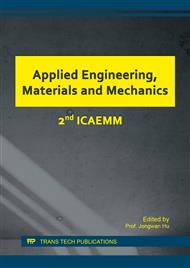p.310
p.316
p.321
p.326
p.331
p.337
p.349
p.354
p.360
Optimization of Regenerative Braking Control Strategy for Pure Electric Vehicle
Abstract:
The regenerative braking strategy for precursor pure electric vehicle was studied in this paper. Firstly, a constraint optimization model was established for the braking force distribution, in which both braking stability and recovery efficiency of braking energy were taken into account. Secondly, Particle Swarm Optimization (PSO) algorithm was applied to optimize the multi key parameters in the model. Finally, the optimized braking torque of the motor was obtained at different speed, different braking strength and different battery charge state. A vehicle model was built to validate the optimized results through simulation. The results showed that, compared with the original control strategy, the optimized control strategy not only could increase the braking stability effectively, but also improve the energy recovery efficiency in a certain extent.
Info:
Periodical:
Pages:
331-336
DOI:
Citation:
Online since:
October 2017
Authors:
Price:
Сopyright:
© 2017 Trans Tech Publications Ltd. All Rights Reserved
Share:
Citation:


